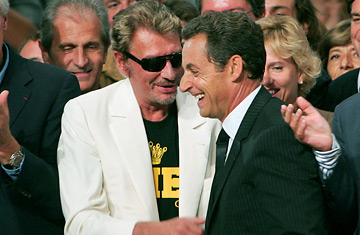
Sarkozy greets French singing star Johnny Hallyday
During her rise to fame, American comic Roseanne Barr once baited detractors with the observation that she and then-husband Tom Arnold were "America's worst nightmare: white trash with money." Some pundits in France are now wondering if there isn't something of that at work with French President Nicolas Sarkozy's iconoclastic Elysée reign. Out are the days of somber, aloof and understated figureheads of the French Republic; welcomed in are the celebrity and multi-billionaire visitors, whom Sarkozy greets while wearing expensive suits, stylish sunglasses and conspicuously large wristwatches. Sarkozy has become what the front page of Wednesday's Libération called "The Bling-Bling President."
"Sarkozy the man has pulverized the institutional president by incarnating democracy of the individual anointed by a show business political class," wrote Libération editor-in-chief Laurent Joffrin just days after Sarkozy's sparked a massive media frenzy with the revelation he's romantically involved with former model and millionaire heiress Carla Bruni. "He's perfectly integrated the oh-so-contemporary culture of reality TV made up of exposing the intimate, of popular speech, and of ferocious competition. The soap opera of his love life displayed on glossy pages is just an illustration of that."
Joffrin isn't the only pundit who has lamented Sarkozy's star-struck flashiness in an office formerly characterized by the monumental solemnity of Charles de Gaulle, the intellectual loftiness exhibited by Valéry Giscard d'Estaing and François Mitterrand, and the less formal yet dignified detachment of Jacques Chirac. The French media has wryly covered Sarkozy's open affection for celebrities like iconic rock star Johnny Hallyday, popular comic actor Christian Clavier, and the subtly named Doc Gyneco — a rapper whose dwindling popularity and fan base further shrunk when he announced his support for Sarkozy's presidential bid. Sarkozy has no lack of famous, wealthy friends — nor any problem broadcasting them.
Why is that perceived immodesty a problem — particularly in a French President who likes to cast himself as "the American" leader unafraid of adopting the dynamic aspects of U.S. society he feels France needs? First off, because even as it follows Sarkozy's lead to reform elsewhere, much of French society still remains unwilling to drop the traditional attitudes that frown upon the flaunting of wealth, and which divide the celebrity of showbiz and the recognition of political leadership in separate categories. Sarkozy may well express his admiration for the career trajectory of Arnold Schwarzenegger, but French voters take politics too seriously to let that kind of Hollywood fame get mixed into governance. "Where some of us have a problem is with the apparent starization of the presidency" one conservative member of parliament who asked not to be identified explains. "We know Nicolas Sarkozy is a brilliant politician and capable leader, but there's a difference between being the President of France and being a staple of the celebrity magazines as a sidekick of Johnny [Hallyday]."
Such attitudes explain the other issue some have with Sarkozy unabashedly admiring the same stars, musicians and even reality TV programs everyone else in France does: the disdain that the average French person frequently expresses for the average French person. Indeed, the very term "français moyen" literally means "average French person", but is usually used to refer to the kind of vulgar, uncultured and intellectually lazy person that "white trash" and "chav" designates in the U.S. and U.K. And that's an image that Sarkozy detractors predict will return to haunt him in the public mind over time.
But don't expect that to spook Sarkozy into a reaction of modesty and self-effacement just yet. Careful manipulating of his private life in the press has become an established part of his communications strategy: for example, he'll invariably allow his personal life to dominate when he wants to divert media attention away from political troubles. That was certainly the case when he sprung his romance with Bruni on a French public that had been watching Sarkozy take a prolonged bashing over his hosting incorrigible Libyan leader Muammar Gaddafi. And it was déjà vu when he announced his long-anticipated divorce on the same day he faced the first massive strikes to protest his reform program. Indeed, given that strategy of using hype and glitter to escape from political hardball, why would Sarkozy even be tempted to distance himself from the professionals of that trade: the very celebrities he calls friends?
